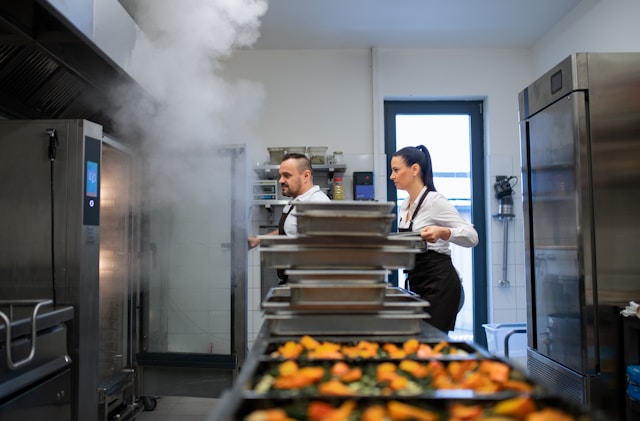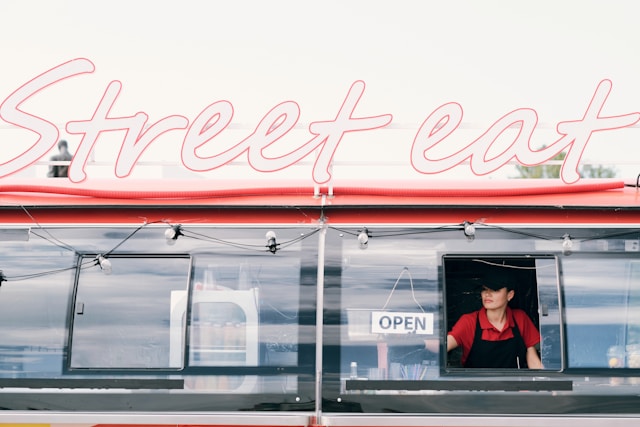Food Truck Commissary Costs and Rentals: A Guide for Food Entrepreneurs
Discover food truck commissary costs and rentals. Learn about pricing, benefits, and tips for choosing the best facility to support your business.

Continue exploring the next articles in this series:
Master the art of food truck setup. From choosing equipment to creating efficient layouts, this guide covers everything you need…
Or navigate back to explore other related content :
Start your food truck business with confidence. Learn the essential steps, from planning and funding to branding and launching successfully.
Introduction
A food truck commissary is more than just a shared kitchen—it’s the backbone of many food truck operations. Commissaries provide essential facilities for food preparation, storage, and cleaning, all while ensuring compliance with health and safety regulations. However, understanding the costs and rental options for commissaries is crucial to managing your budget effectively. In this guide, we’ll explore what commissaries offer, how much they typically cost, and how to choose the right one for your food truck business.
01: What is a Food Truck Commissary?
A food truck commissary is a licensed, shared-use commercial kitchen that provides food truck owners with space to:
- Prepare and Cook Food: Meet health department standards by using certified kitchen facilities.
- Store Ingredients and Equipment: Utilize refrigeration, dry storage, and freezers.
- Clean and Sanitize: Wash dishes, utensils, and truck interiors using approved equipment.
Commissaries are designed to support food truck operations, ensuring compliance with local health regulations while offering a cost-effective alternative to building your own kitchen.
02: Benefits of Using a Commissary
Health Compliance
Using a commissary ensures that your food preparation meets health department requirements, reducing the risk of fines or closures during inspections.
Cost Efficiency
Renting a commissary is significantly cheaper than building and maintaining your own commercial kitchen. This is especially beneficial for startups or trucks with limited budgets.
Access to Professional Equipment
Commissaries provide high-quality, commercial-grade equipment that may be out of reach for individual food truck owners. This includes:
- Industrial ovens and stoves.
- Refrigeration and freezing units.
- Dishwashing stations.
Networking Opportunities
Sharing a commissary with other food truck operators can lead to valuable collaborations, insights, and support within the industry.
03: Typical Costs of Commissary Rentals
The mobility of food trucks allows owners to adjust their location based on demand, weather, and local events. This flexibility helps maximize sales potential while reducing risks associated with fixed locations.
Flexibility and Adaptability
The cost of renting a commissary kitchen varies depending on location, amenities, and usage. Here’s a breakdown of common pricing structures:
Hourly Rates
Most commissaries charge hourly fees, which typically range from $15 to $50 per hour. This option is ideal for trucks that require occasional use.
Monthly Memberships
For trucks with consistent operations, many commissaries offer monthly memberships. These can cost between $300 and $1,500, depending on the level of access and included amenities.
Additional Fees
Some commissaries charge extra for:
- Refrigeration or freezer space.
- Dedicated storage lockers.
- After-hours access.
When evaluating costs, be sure to ask for a full breakdown of fees to avoid surprises.
04: Factors to Consider When Choosing a Commissary
Location
Proximity to your primary operating area is crucial. A commissary close to your truck’s route minimizes travel time and fuel costs, making operations more efficient.
Availability
Ensure the commissary has sufficient availability during your preferred hours. Overbooked facilities can lead to scheduling conflicts that disrupt your operations.
Amenities and Equipment
Choose a commissary that meets your specific needs. For example:
- Trucks specializing in baked goods require ovens and proofing stations.
- Juice or smoothie trucks need high-powered blenders and ample refrigeration.
Cleanliness and Maintenance
Visit the commissary to inspect its cleanliness and upkeep. A well-maintained facility reflects a commitment to hygiene and professionalism.
Community and Networking
Some commissaries foster a community atmosphere, hosting events or offering resources for food entrepreneurs. Consider whether this aligns with your business goals.
05: Alternatives to Commissary Kitchens
While commissaries are popular, they aren’t the only option for food truck operators:
- Shared Kitchen Rentals: Smaller-scale facilities often offer lower rates but fewer amenities.
- Restaurant Partnerships: Some restaurants rent out their kitchens during off-hours.
- Home-Based Commercial Kitchens: If permitted by local laws, building a commercial kitchen at home can provide convenience and long-term savings.
Each alternative comes with its own costs and regulations, so weigh the pros and cons carefully.
06: Tips for Maximizing Commissary Value
Plan Your Schedule Efficiently
Book your commissary time during off-peak hours to save money and avoid conflicts. Prepare a detailed schedule for food prep, storage, and cleaning tasks.
Share Costs When Possible
If your commissary allows, consider splitting rental fees with another food truck owner during shared shifts.
Use Resources Wisely
Take advantage of all the amenities your commissary offers, from bulk storage to professional-grade equipment, to maximize your investment.
Build Relationships
Establishing good relationships with commissary staff and other renters can lead to preferential scheduling, referrals, and collaboration opportunities.
07: Understanding the Role of Commissaries in Your Budget
Commissary costs should be factored into your operating budget alongside expenses like food supplies, truck maintenance, and permits. For many food truck businesses, the efficiency and compliance benefits outweigh the costs, making commissaries a smart investment.
08: Next Steps in Your Food Truck Journey
Understanding commissary costs and rentals is a vital step in building a sustainable food truck business. Whether you’re just starting out or looking to optimize operations, choosing the right commissary can make all the difference. Ready to dive deeper? Check out these guides:
Food Truck Business Operations: Learn how to streamline daily tasks and workflows.
Checklist of Things You Need to Operate a Food Truck: Ensure you’re fully prepared for day-to-day operations.
- FAQ
fREQUENTLY ASKED QUESTIONS
What is a food truck commissary?
A commissary is a licensed, shared-use kitchen that provides facilities for food preparation, storage, and cleaning, ensuring compliance with health regulations.
How much does a commissary kitchen cost?
Costs range from $15–$50 per hour or $300–$1,500 per month, depending on location and amenities.
Why do food truck operators use commissaries?
Commissaries offer cost-effective access to professional equipment, ensure health compliance, and provide networking opportunities.
Are there alternatives to commissary kitchens?
Yes, alternatives include shared kitchen rentals, restaurant partnerships, and home-based commercial kitchens (if legally permitted).
What should I consider when choosing a commissary?
Look for a location close to your operations, suitable amenities, good cleanliness, and availability during your preferred hours.
Continue exploring the next articles in this series:
Considering starting a food truck? Learn the 10 essential factors to ensure success, from planning and budgeting to branding and…
Master the art of food truck setup. From choosing equipment to creating efficient layouts, this guide covers everything you need…
Or navigate back to explore other related content :
Start your food truck business with confidence. Learn the essential steps, from planning and funding to branding and launching successfully.
- 176A South Van Brunt Street Englewood, NJ 07631
Copyright © 2023 Le Gourmet Factory. All Rights Reserved. Website Design, SEO and Internet Marketing by Creative Click Media.



